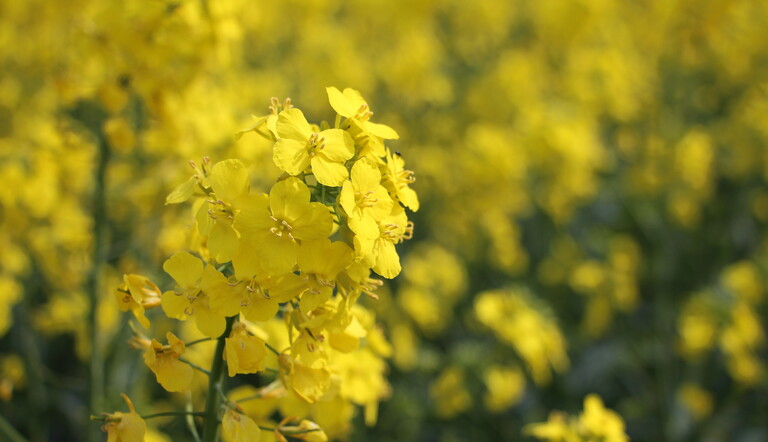
Powering-up post-emergence weed control in OSR

Using a selection of different herbicides active ingredients and modes of action will maximise weed control and can also help to reduce the risk of weeds becoming resistant to any single active ingredient.

*No known resistance to herbicides
Several grass and broad-leaved weeds are already resistant to a few herbicides, so it pays to use a range of actives throughout the season to spread the risk and reduce the over-exposure of any single active.
Post-emergence herbicide options
SULTAN 50 SC (500 g/l metazachlor) is a cost-effective residual herbicide for use in winter and spring oilseed rape to control a wide range of broadleaved weeds and annual grasses particularly annual meadow grass. It is also valued for its activity on black-grass where it offers useful performance inhibiting blackgrass until clethodim and propyzamide can be deployed,.
SULTAN can be used at pre- or early post-emergence (up to four leaves of the crop): this gives growers the option to delay spraying until GS12-14 if the pre-emergence window was hampered by poor conditions or if the seedbed was poor and cloddy.
SULTAN is approved for use on all soil types except the very lightest land, sands and those with more than 10% organic matter.
SULTAN also provides incidental control of Groundsel and Bur Chervil: weeds which are rapidly becoming increasingly troublesome for many growers.
Irrespective of whether SULTAN is used as a pre- or post-emergence treatment, it must be used in accordance with the guidelines set out within the Voluntary Initiative
Stewardship Scheme to prevent run-off and leaching losses into water courses.
PLEASE NOTE: do not use SULTAN with filters finer than 50 mesh.
FALCON (100 g/l propaquizafop) is incredibly good at controlling volunteer cereals in a wide range of crops and is also useful against annual meadow grass up to three leaves. Reduced rates are typically used for volunteer cereals with the dose dependent on the crop species, with accurate timing of application critical to efficacy. Dose rate advice for different grass weeds is available here (https://www.adama.com/uk/en/our-solutions/herbicides/falcon).
FOX (480 g/l bifenox) bifenox is available for use in OSR via a new label approval (https://www.adama.com/uk/en/our-solutions/herbicides/fox)
LEGION (375 g/l metazachlor and 125 g/l quinmerac in an SC formulation) is a residual herbicide for use in winter oilseed rape. LEGION can be used as a pre- or early post-emergence treatment (up to the 4-leaf stage and before the end of January) to control annual meadow-grass and a range of broadleaved weeds. LEGION provides improved control of cleaver, poppy, shepherd’s purse, and mayweed. compared to Sultan 50 SC and is very effective against Bur Chervil: in Germany, where ALS herbicide resistant Bur Chervil is a problem, LEGION typically delivers more than 90% control when used as either a pre- or post-emergence treatment. Similar to SULTAN, applying LEGION early post-emergence, ideally when the crop is at the 1-3 leaf stage, is optimal. This timing ensures that the herbicide is on before the main flush of weed emergence, maximising the application and potentially reducing the need for further interventions later in the season.
The importance of crop competition as part of integrated weed management in OSR
Crop competition starts with strong establishment. This can be encouraged through several agronomic practices:
Optimising seed rates: Sowing at appropriate densities ensures that OSR plants can form a dense canopy quickly, which helps to suppress weed growth by limiting the light and space available to weeds.
Timely drilling: Ensuring that OSR is drilled in conditions that favour rapid germination and early growth gives the crop a head start over weeds. This is particularly important when combined with residual herbicides, as the crop can take advantage of reduced weed competition.
Nutrient management: Providing adequate nutrients during the early stages of growth supports vigorous OSR establishment, further enhancing its competitive edge.
In fields with high weed pressure or where volunteer cereals are a known issue, maximising crop competition through these practices can be as important as the herbicide strategy itself. A competitive OSR crop is more resilient and can better withstand stresses throughout the growing season.
ADAMA early post-emergence herbicide applications to OSR and effect on companion crops
Many growers are turning to companion cropping as an option to reduce the host finding effectiveness of cabbage stem flea beetle (CSFB). The principle proven species for CSFB confusion strategies is buckwheat and all the herbicides in this article will have no or minimal effect on buckwheat
Latest articles

A look at the next generation of cereal disease control - ADAMA In Action 2025
